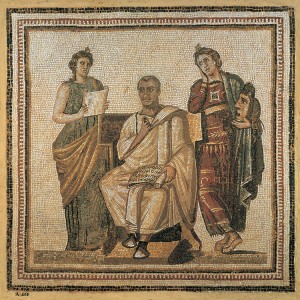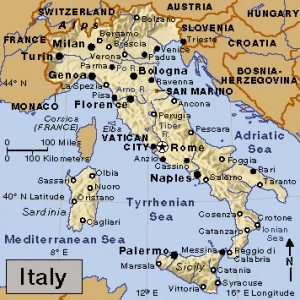Language Monday: Latin
Monday, June 11th, 2018June 11, 2018
For today’s language—Latin—we move from the living to the dead, so to speak. Until now, Language Mondays have discussed “living” languages. Latin, however, is classified as a “dead” language—that is, one that does not change. Latin is a dead language because it exists almost exclusively as literature written centuries ago. To change, and thus be considered alive, a language must be used by many people in everyday life.

The poet Virgil, seated, wrote of Rome’s creation in his great Latin language epic, the Aeneid. Credit: Mosaic (A.D. 200′s); Bardo Museum, Tunis, Tunisia (Giraudon/Art Resource)
Latin once was alive. In fact, it was the principal language of western Europe for hundreds of years. It was the language of the Roman Empire, and Roman soldiers and traders took it wherever they went. It became especially important in law and government because of its precise expression. It was also the language used in a number of important works of literature and philosophy. Among the classics of Latin literature are the written orations of Cicero, who is sometimes called the greatest master of Latin prose: De rerum natura (On the Nature of Things), a philosophical and scientific poem by Lucretius; the Aeneid, an epic poem by Virgil; the Odes, a collection of poems by Horace; the Metamorphoses, a narrative poem by Ovid with more than 200 tales taken from Greek and Roman legends and myths; and Histories and Annals, descriptions of Roman history by Tacitus.
During the Middle Ages, a form of Latin called Medieval Latin became the language of the Christian church and of education. It was used by scholars in universities and schools throughout Europe. By the early 1500’s, however, Latin had stopped being a spoken language. Today, the Roman Catholic Church still considers Latin its official language, though Mass has been celebrated in the tongue of the local community since the mid-1960’s.
But Latin did not entirely go away. The Latin of the late Roman Empire developed into what are known as the Romance languages, including French, Italian, Portuguese, Romanian, and Spanish. The word romance comes from a Latin adverb that referred to speakers of Latin who were said to fabulare romanice, which means speak in the Roman way. The Romance languages developed from vernacular Latin, a form of Latin spoken by common people in certain European countries that were conquered by Rome and became Roman provinces.
English, though considered a Germanic language, has many words that have Latin words as their roots. For example, the English words equal, adequate, equable, and equate all have the Latin word aequus (fair) as their root. The word extinct comes from exstinguere (to extinguish). To say someone is in excruciating pain is to indicate that the person is suffering extreme pain. The word excruciating comes from the Latin word excruciare, meaning to torture or to crucify. Excruciare has as one of its own Latin roots, the word crux, meaning cross. Readers of J. K. Rowling’s series of books on the wizard Harry Potter (and the movies based on them) will notice that excruciare would be a root word of cruciatus. In Harry Potter’s world, the Cruciatus Curse is one of the Unforgivable Curses and inflicts severe pain on its victim. Rowling uses a number of other Latinate words for the charms and curses in the Potter books, including Accio (a summoning charm) and Expelliarmus (a charm used to disarm opponents).
A number of Latin terms and expressions continue to be used in their Latin forms. The language of scientific classification has always used Latin and Greek words. Early Western scholars gave organisms Latin and Greek names, and later scientists have kept them because their definitions do not change over time.
Latin terms, or abbreviations of them, are commonly used in bibliographies at the end of nonfiction books. For instance, et al. (for et alii or et alia) means and others. So if the term et al. appears after the name of an author, it means that others were involved in writing the cited book.
Latin expressions and abbreviations occur in a number of other places as well. Have you ever used the initials A.D. when giving a date? They stand for anno Domini—in the year of our Lord. How about i.e. (for id est—that is), e.g. (exempli gratia —for example), circa (about), or etc. (et cetera—and so forth)?
Some Latin expressions have become commonplace. For example, the ancient Roman leader Julius Caesar sent this famous dispatch to the Senate after he defeated King Pharnaces II of Pontus: Veni, vidi, vici (I came, I saw, I conquered). The image of a roaring lion—a symbol of Metro-Goldwyn-Mayer motion-picture studios—is accompanied by the Latin motto, Ars Gratia Artis (Art for Art’s Sake). The expression Amor vincit omnia (Love conquers all) is also well known.
So, even though technically Latin is considered a dead language, its legacy lives on. It does not entirely RIP (requiescat in pace, or rest in peace).




